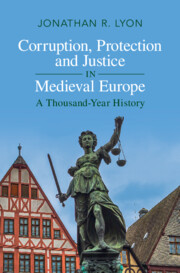Book contents
- Corruption, Protection and Justice in Medieval Europe
- Corruption, Protection and Justice in Medieval Europe
- Copyright page
- Dedication
- Contents
- Maps and Figures
- Acknowledgments
- Abbreviations
- Additional material
- Introduction
- 1 The First “Medieval” Advocates
- 2 Putting Down Roots in Ninth-Century Francia
- 3 The “Aristocratization” of Post-Carolingian Advocacy
- 4 Elite Competition at the Turn of the First Millennium
- 5 The Limits of Church Reform
- 6 Pigs and Sheep, Beer and Wine, Pennies and Pounds
- 7 A History of Violence
- 8 Weapons of the Not-So-Weak
- 9 The Murder of Archbishop Engelbert
- 10 Widening the Lens
- 11 The Emperor as Vogt, ca. 1000–1500
- 12 From Lordship to Government?
- 13 Reframing the History of Violence
- 14 Crossing the False Divide
- 15 A Cultural History of the Rapacious Advocate, or: William Tell’s Revenge
- Conclusion
- Works Cited
- Index
6 - Pigs and Sheep, Beer and Wine, Pennies and Pounds
Published online by Cambridge University Press: 12 October 2022
- Corruption, Protection and Justice in Medieval Europe
- Corruption, Protection and Justice in Medieval Europe
- Copyright page
- Dedication
- Contents
- Maps and Figures
- Acknowledgments
- Abbreviations
- Additional material
- Introduction
- 1 The First “Medieval” Advocates
- 2 Putting Down Roots in Ninth-Century Francia
- 3 The “Aristocratization” of Post-Carolingian Advocacy
- 4 Elite Competition at the Turn of the First Millennium
- 5 The Limits of Church Reform
- 6 Pigs and Sheep, Beer and Wine, Pennies and Pounds
- 7 A History of Violence
- 8 Weapons of the Not-So-Weak
- 9 The Murder of Archbishop Engelbert
- 10 Widening the Lens
- 11 The Emperor as Vogt, ca. 1000–1500
- 12 From Lordship to Government?
- 13 Reframing the History of Violence
- 14 Crossing the False Divide
- 15 A Cultural History of the Rapacious Advocate, or: William Tell’s Revenge
- Conclusion
- Works Cited
- Index
Summary
This chapter addresses the question of why prominent nobles were so interested in being church advocates by examining the legitimate financial benefits that came with the position. Using sources from the period 1050 to 1250, it argues that advocates typically received one-third of the fines when they held court on ecclesiastical estates, and also received food and lodging in return for fulfilling their role as judge. It also demonstrates that many advocates received separate income for their responsibilities in providing protection. While all of these payments were initially in kind, by the thirteenth century it was increasingly common for advocates to receive a single lump-sum money payment for fulfilling all their advocatial responsibilities, which is evidence of the increasing commodification of local positions of authority in this period. This chapter also investigates the numismatic evidence for church advocates as additional source material for the economic dimensions of the role.
- Type
- Chapter
- Information
- Corruption, Protection and Justice in Medieval EuropeA Thousand-Year History, pp. 130 - 152Publisher: Cambridge University PressPrint publication year: 2022



